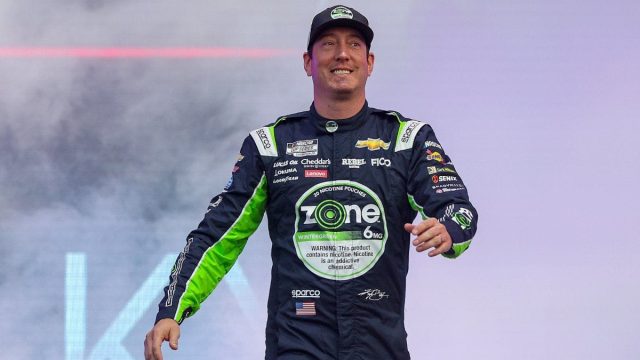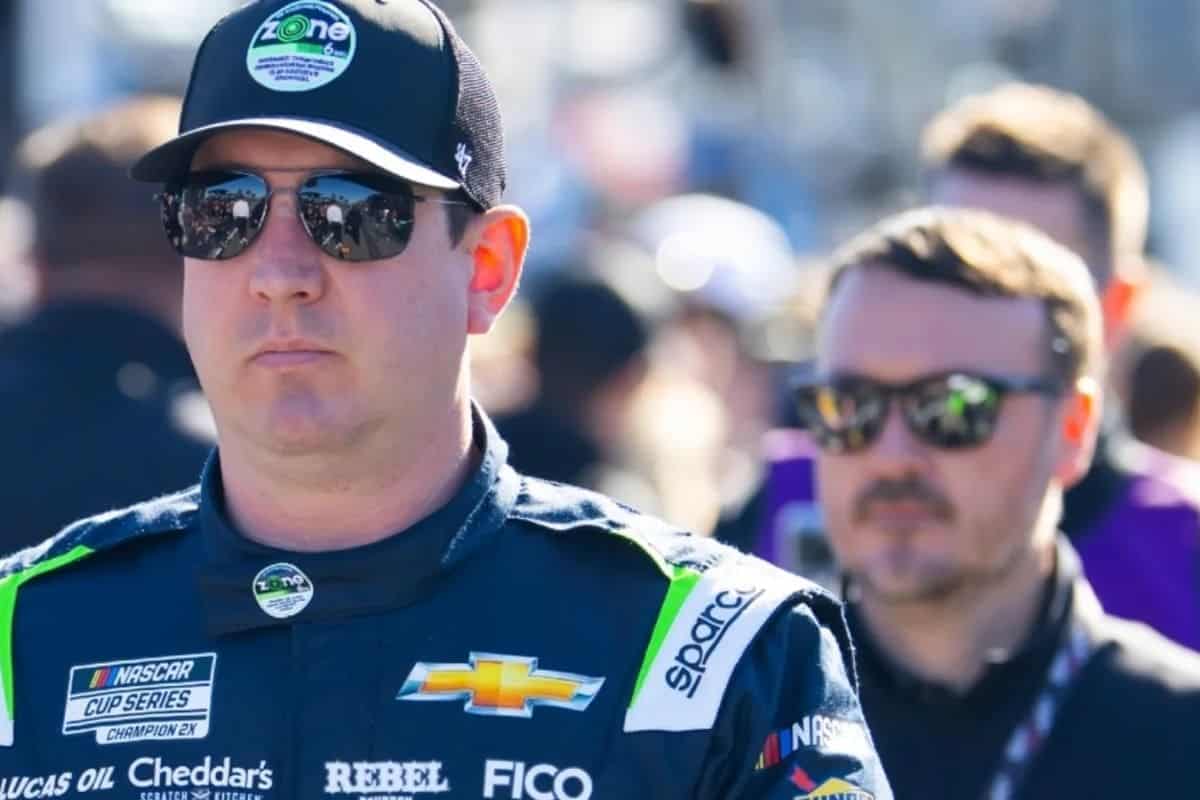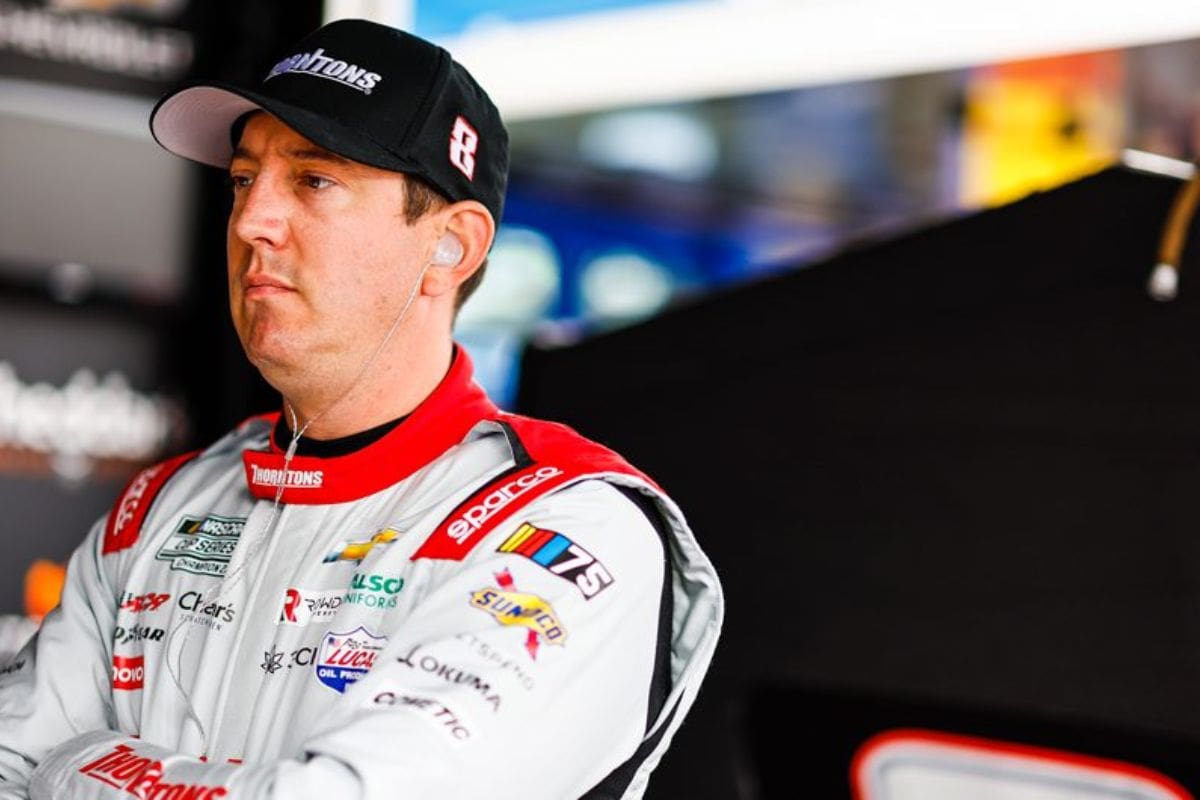Kyle Busch’s Performance Struggles: Kyle Busch, going through a tough time in his NASCAR career, has shared how unhappy he is. He hasn’t won a race in 42 tries, which has made him feel upset and frustrated with the racing community. His declaration, “I don’t have faith in anybody,” highlights a deeper frustration rooted in a series of on-track altercations and perceived lapses in driving ethics. This raw commentary sheds light on his personal battles and ignites a broader conversation about the integrity and accountability within the sport, raising pivotal questions about the evolving dynamics of competitive racing.
Key Highlights
- Kyle Busch is enduring a 42-race winless streak, the longest of his career, affecting his confidence and performance.
- Busch’s frustration stems from five DNFs in the last seven races, questioning competitors’ ability to race cleanly.
- A collision at Pocono involving Corey LaJoie further strained Busch’s trust in racing integrity and accountability.
- Busch’s skepticism about racing standards reflects his broader concerns over the frequency of on-track incidents.
Kyle Busch’s Current Struggles
Kyle Busch is having a really hard time in his NASCAR career right now. He hasn’t won a race in 42 tries and has failed to finish five of the last seven races. This tough period is not just about bad numbers; it’s a big problem showing how he’s dealing with bad luck and not trusting other drivers to race fairly. Busch himself has admitted that he no longer believes his competitors can race cleanly, making his situation even more complicated.
Busch’s remarks on ‘The Pat McAfee Show’ highlight a deep-seated frustration that transcends typical racing setbacks. “I don’t have faith in any of them,” Busch lamented, pointing to a disturbing pattern where he’s been wrecked in five of the last seven races. Such incidents erode not only a driver’s confidence but also their tactical approach to races.
"I don't have faith in anybody because I've been wrecked in five out of the last seven races by somebody..
Our cars haven't been that great lately but we're working on it" ~ @KyleBusch #PMSLive pic.twitter.com/9e7mkpG5Dq
— Pat McAfee (@PatMcAfeeShow) July 19, 2024
Analyzing Busch’s performance through the lens of racing dynamics reveals a clear reality: his current pace may not be aligning with the aggression of the pack, rendering him vulnerable to collisions. His speculation about being ‘slow and in the way’ suggests a mental toll—an introspective questioning of his own racecraft amidst the chaos.
“… I mean, I’ve been wrecked five out of the last seven races by somebody, so I don’t have faith. Maybe I’m just slow and I’m in the way and they know I’m slow, so I’m an easy guy to pass, so they just wanna knock me out.” – Busch
Incident at Pocono
The Incident at Pocono encapsulates the volatile nature of NASCAR racing, where a split-second decision by Corey LaJoie resulted in a dramatic collision with Kyle Busch, unfolding a chain reaction that involved five extra cars. This incident exemplifies the thin margins and split-second reflexes that define the sport, showing the stakes and rapid decision-making required at speeds approaching 190 miles per hour.
The chaos erupted on the Lap 120 restart. Busch, attempting to maintain his position, executed a block maneuver on LaJoie as they approached Turn 1. LaJoie, finding himself squeezed below the apron, had to make a critical decision: to blend back into the race or risk losing momentum. Opting to rejoin the track, LaJoie inadvertently clipped Busch’s car, triggering a multi-car collision that highlighted the precarious balance between aggression and caution in NASCAR racing.
From Busch’s point, the scenario was a textbook example of misjudgment. He recounted, “We’re all kind of fanning out at Pocono down the front straightaway… I’m five-wide and the yellow line starts coming up. Corey’s like, ‘well I gotta back on the racetrack.”
The resultant wreck not only disrupted the race but also emphasized the critical importance of awareness and tactical foresight. The Pocono incident serves as a clear reminder of the high risks and split-second decisions that define the relentless world of NASCAR racing.
Busch’s Reaction to LaJoie
In a candid revelation, Kyle Busch didn’t mince words, labeling Corey LaJoie a ‘liar‘ for his shifting narratives and warning that ‘payback is coming.’ Busch’s frustration stems from an incident where LaJoie’s explanations for a wreck changed multiple times, eroding any semblance of trust between the drivers. “He texted me and then he called me,” Busch explained. “I didn’t even reach back out because he changed his story four times, so I’m like, ‘you’re just a liar. You wrecked me.’ I get it. It’s fine. Payback is coming.”
Busch’s reaction emphasizes a broader issue in the racing community: accountability and integrity on the track. In a sport where split-second decisions can determine outcomes, the reliability of a competitor’s word is paramount. LaJoie’s shifting explanations have not only angered Busch but have also raised questions about his credibility among peers.
While some may see Busch’s response as harsh, it is emblematic of the high-stakes environment in which these athletes operate. In NASCAR, trust and respect are earned on the track, and Busch’s words serve as a clear reminder of the consequences of failing to uphold these values.
Busch’s Perspective on LaJoie’s Actions
Busch talked about LaJoie’s actions during the Pocono restart, showing a key moment where quick decisions and high-speed moves led to big problems. Busch described what happened, explaining the tricky choices drivers have to make at 190 miles per hour. The restart was a perfect example of NASCAR’s wild energy, with cars spreading out as drivers fought for position.
From Busch’s vantage point, LaJoie’s decision-making was questionable, especially given the stakes. Busch described being five-wide, a precarious situation on any track, let alone Pocono’s tricky front straightaway. As he attempted to maintain his line, LaJoie was forced to navigate the narrowing space dictated by the encroaching yellow line. It was at this juncture that critical judgment came into play—or, as Busch would argue, failed to materialize.
LaJoie’s attempt to re-enter the racetrack instead of blending behind Busch led to a fateful clip that could have endangered numerous drivers. Busch’s frustration was palpable as he questioned the rationale behind LaJoie’s aggressive maneuver. “That’s just like stupid. What are we doing?” he remarked, highlighting the inherent risks involved in such decisions. In Busch’s view, LaJoie prioritized immediate positioning over collective safety, a miscalculation that highlighted the razor-thin margin for error in racing.
I’m five-wide and you’ll see down here at the bottom right of the screen, the yellow line starts coming up and Corey’s like, ‘well I gotta back on the racetrack.’ Instead of just blending in behind me and making sure he doesn’t crash the whole field, he just clips me. That’s just like stupid. What are we doing. We’re going 190 miles an hour into that corner and we’re going to wreck each other?” – Busch
This incident serves as a microcosm of the broader challenges drivers face: balancing assertiveness with prudence, especially in high-stakes scenarios. Busch’s critique of LaJoie’s actions emphasizes the importance of tactical foresight and situational awareness in maintaining both competitive edge and safety.
Kyle Busch’s Broader Frustrations
Expressing a candid critique, Kyle Busch conveyed his broader frustrations with the current state of racing, highlighting his growing skepticism about the field’s ability to maintain clean competition. This sentiment stems from repeated incidents where he found himself compromised on the track, questioning the integrity of his fellow competitors.
Busch’s complaints are understandable. As a veteran driver, he has been in many crashes, which he believes show a bigger problem with how drivers behave on the track. He is clearly frustrated and even wonders if his own speed might be causing some of these accidents. However, this doesn’t lessen his criticism. Instead, it highlights the difficulties of navigating a sport where aggressive driving and reckless behavior can often look the same.
The implications of Busch’s discontent extend beyond personal angst; they resonate with broader discussions about the evolving dynamics of competitive racing. The increasing frequency of on-track incidents raises questions about the efficacy of current regulations and the enforcement of fair play. Busch’s skepticism about the field’s ability to race cleanly serves as a clarion call for a reassessment of standards and practices within the sport.
News in Brief: Kyle Busch’s Performance Struggles
Kyle Busch’s recent tribulations highlights a profound disillusionment with the current state of competitive integrity in racing. His 42-race winless streak and multiple on-track incidents have catalyzed a critical reassessment of racing standards and competitor accountability.
Busch’s candid reflections reveal a pressing need for the racing community to address these issues to restore faith and maintain the sport’s credibility. This period of adversity may prompt considerable changes in racing conduct and regulatory oversight.
ALSO READ: Denny Hamlin Supports Kyle Busch Despite His RCR Team’s Struggles



